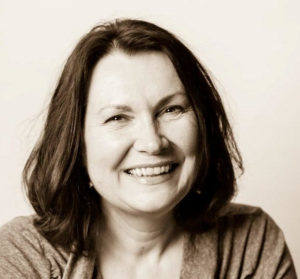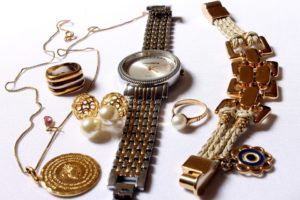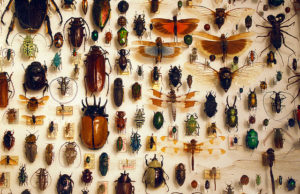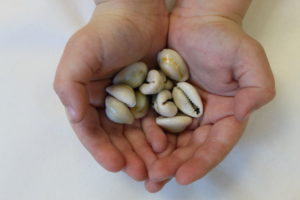Today SevenPonds connects with Sarah Hirsch, an estate organizer and genealogist who works with clients on sorting and properly memorializing personal possessions. When a loved one dies, it’s often difficult for families to go through their loved one’s things and decide which objects to keep. Hirsch helps families in the San Francisco Bay area make these difficult decisions.

Credit: Sarah Hirsch
Marissa: What do you do for your clients as an estate organizer?
Sarah: In short, I sort! I sort through personal possessions — sometimes an entire household, sometimes a specific portion, like paperwork — to identify important items and create clarifying order. It’s hard to overstate how challenging it is to settle an estate. The task is daunting even without any emotional burden. Families must function while wrestling with issues surrounding loss, illness, death, and interpersonal conflict. They can become overwhelmed pretty quickly, and perspective is often one of the first casualties.
The term estate organizing suggests that there has been a death. In my work, this isn’t always the case. Someone might move into a nursing home, taking very little with them. Or an elder may no longer be able to manage their affairs, creating an unsafe living environment. It is equally important in all these situations that the sorting/purging be done respectfully. I don’t imagine that many of us would appreciate people barging into our home, passing judgment on all our belongings and throwing them away as fast as possible!
Marissa: Why do people need an estate organizer?
Sarah: Family and friends are usually under a great deal of stress after a death, probably more than they realize. The chances of accident, injury, and illness increase dramatically as stress levels rise. The guidance of a professional organizer can support the family’s emotional and psychological well-being while preventing costly mishaps and missteps. From a practical perspective, the family may simply not know where to start or what to look for. Sorting through an entire home is time consuming and physically demanding. Sorting itself is not a skill that everyone has or enjoys.
Marissa: In your experience, what are some of the common problems that people face when they try to handle things without an estate organizer?
Sarah: People sometimes assume that they know how to “clean out a house,” which I don’t think accurately describes the task. They may attack the problem with open trash bags, picking up items at random to throw away. This unconscious approach inevitably leads to the baby being thrown out with the bathwater. Well, OK, I’ve never heard of a real baby being inadvertently disposed of. But plenty of other important stuff does get tossed, including good family relationships.

Credit: pixabay.com
I know of an instance where an organizer discovered many thousands of dollars worth of jewelry in her client’s trash. The client had thrown things away either without looking carefully or perhaps because they weren’t able to recognize the value of what they were seeing. One of my clients permanently misplaced the estate’s original Will & Trust documents. What a headache!
Marissa: You talk about the power of personal belongings, especially after someone has died. How can genealogy help families heal?
Sarah: It can help people discover a new sense of identity and belonging, which is especially important when a person’s familiar identity has been deeply shattered by loss. Building a family tree can become a memorial and love letter to one’s family.
It’s pretty common to uncover family history information when going through the home. Parents may have squirreled it away after inheriting it from their parents, perhaps without really looking at it. For a complex mix of reasons, Americans don’t always talk comfortably about the past, much less honor our ancestors. Family history often fails to be transmitted even to the next generation. Yet, we are each only the newest link in ancient, fragile chains. And, we are each here thanks to the struggle and perseverance of those who came before us. Discovering this can take us out of ourselves, giving us greater perspective, gratitude, and compassion.

Credit: Wikiimedia.org Lin Kristensen
Marissa: What are some of the common objects that families tend to hold onto? The objects that usually have the most emotional ties, in other words?
Sarah: The items most commonly kept items are the ones that need to be kept, like legal and financial documents. What strikes me most about the things people want to keep is how utterly unique and personal they are. I can name categories like clothing, photos or books, but this can’t explain the meaning a particular thing has for a particular person. Story and memory live in the object. Naming the object alone doesn’t tell its story.
Marissa: As a follow-up to the last question, what are some of the things that you think are beneficial for grieving families to keep?
Sarah: Circumstances vary so much that what makes sense for one family may not be at all appropriate for another. The Garcia children might cherish their parents’ heirloom furniture, while the Smith children have no interest in antiques or need to sell as much as possible to pay medical bills. Having said this, I do usually advocate for keeping family history materials.

Credit: flickr.com Barta IV
The things people don’t keep can be just as impactful as what is kept. After their mother died, one family donated everything they weren’t keeping to the local thrift store where their mom had volunteered for years. Donations can create legacy and play an important role in the grieving process. A daughter donated her father’s rock collection to a university geology department. In a very different story, another daughter burned her father’s insect collection because she hated it. How much more constructive it would have been to donate to, say, a school science class!
Marissa: How should families store special items?
Sarah: Dark, dry, and cool is the storage rule for organic materials like fabric, leather, paper, and photos on paper. The top culprits of destroyed items are light, humidity, and heat.
Avoid long term wrapping and storing in plastic. Plastics pose a chemical threat because almost all plastics give off gas. Archival quality polyester or polypropylene sleeves are used for document and photo storage, but beware of you sources. The ones available at the office supply store may claim to be archival and acid-free, but this is meaningless. There are no manufacturing or labeling regulations, so any manufacturer can state that a product is archival. And acids are not used to produce plastics, so the acid-free claim is nonsense.
Here are a few archival supply manufactures/suppliers trusted by conservation professionals: Talas, Archival Methods, Hollinger Metal Edge and Atlantic Protective Pouches.
Marissa: What steps should a family take to go through the personal belongings of someone who has died?
Sarah: That’s easy — safety first! Safety tips may sound boring, but I want to prevent people from tripping headlong over stuff piled on stairs, or getting shot by a loaded gun falling off the top shelf of an overstuffed closet. These things do happen.
Here are a few safety tips:
1 – Are the plumbing, electrical, heating, air condition systems in safe working condition?
2 -Do the doors, windows, and gates all lock? Is there a working alarm system?
3 – Are there weapons in the house? Where?
4 – Is there a clear path to exits? There should be more than one easily accessible exit.
5 – Trip hazards: Keep hallways and walkways clear. Use tabletops for sorting and storing whenever possible.
6 – Self-care: Consider how useless you’ll be if you’re injured or become sick because you didn’t adequately look after your own needs!
To get an estate organized, take these steps:
Start with the kitchen if you’re not sure where else to start. Most everything in a kitchen isn’t emotionally-charged, and you’ll need to get rid of perishable food as soon as possible.
Go through each room with a focus on sorting, not tossing. Group everything into categories like paperwork; office supplies; keys, jewelry, and valuables; kitchenware; clothing; decor; and prescription medications.
Keep any tools you find, like hammers or screwdrivers, in a spot that’s easy to reach, and only move them out of the house once you’re done organizing. (You can use them for minor repairs or to remove items from the house as you work.)
Search inside each book, because these are a favorite hiding place for valuables like cash, photos or love letters.
Empty and remove all drawers to catch any items that have fallen into cracks.
Check clothing pockets and purses for items (this sort of job is best assigned to children or people with mobility issues, since they are low-energy, detail-oriented and time-consuming processes).
Go slow. Pace yourself and pay attention. In the long run, you’ll actually go faster this way, and stay much safer.
Marissa: What are some of the biggest success stories you’ve had as an estate organizer and genealogist?

Credit: wikipedia.org
Sarah: I rarely know what things I do or say that make the biggest difference for clients. From my perspective, the successes are a steady stream of small victories; a cabinet cleared, a car title found, an antique family photo discovered behind a drawer. Small things can turn out to be deeply meaningful.
In one estate, there were a few feathers, shells and stones scattered throughout the home — objects probably picked up on walks. They would have been easy to discard, but I gathered them together. When the executor saw the pile, he realized that it would be perfect for an upcoming memorial ceremony.
Marissa: What should families keep in mind as they organize an estate?
Sarah: The profound transition of death and the torch passing from one generation to the next is an event like no other. I’m in favor of families keeping as much as they want to, can afford to, and have room for. Belongings can always be disposed of later, but once they’re gone, they can rarely be retrieved. It’s true that a person may look at an item in a few years and wonder why in the world they kept it. But this will serve as a clear marker of their movement through grief. I don’t think it’s healthy to get rid of too much stuff immediately after a death — or to make any big changes unless necessary.

Credit: pixabay.com
Major loss can trigger any number of extreme reactions that indicate someone is running away from their feelings. People may react by wanting to keep everything or to get rid of everything. I’m fascinated by the stories of people who destroy everything. I was recently asked for help in finding photos of someone’s ancestors. The woman told me that she didn’t have any because her alcoholic grandmother burned them all. Burning family photos is surprisingly common.
I was discussing genealogy with a man who told me that he has no family records. When his grandparents died, his parents, aunts and uncles went to the house, built a bonfire in the yard, carried out the entire contents of the house and burned everything. I was shocked, and the man still seemed quite shocked himself. Cremation is an honorable way to dispose of a body, but not an estate! The decisions made about what to keep and what to discard can reverberate down through generations.

 What Is an Estate Organizer, and How Do They Help Families Heal? An Interview with Sarah Hirsch
What Is an Estate Organizer, and How Do They Help Families Heal? An Interview with Sarah Hirsch


 John Mulaney’s “Funeral Planning” on Netflix: No Real Plan
John Mulaney’s “Funeral Planning” on Netflix: No Real Plan

 Composting Bodies Is Now Legal in a Dozen States
Composting Bodies Is Now Legal in a Dozen States














